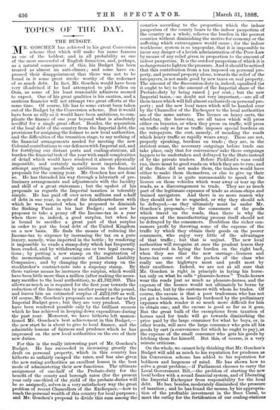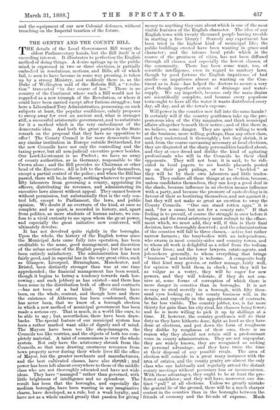TOPICS OF THE DAY.
THE BUDGET.
MR. GOSCHEN has achieved in his great Conversion scheme that which will make his name famous as one of the boldest, and in all probability as one of the most successful of English financiers, and, perhaps, as a natural consequence of this, his Budget has been treated as almost an anti-climax ; and some have ex- pressed their disappointment that there was not to be found in it some great stroke worthy of the redeemer of so much debt. In fact, Mr. Goschen would have been very ill-advised if he had attempted to pile Pelion on Ossa, as some of his least reasonable admirers seemed to expect. One of his great qualities is his caution, and a cautious financier will not attempt two great efforts at the same time. Of course, life has to some extent been taken out of the Budget by the Conversion scheme. But it would have been as silly as it would have been ambitious, to com- plicate the finance of one year beyond what is absolutely needful for a single great effort. Besides, the separation of the local debt of the country from the Imperial debt, the provisions for assigning the former to new local authorities, and the difficulties of the transition stage, to say nothing of the financial arrangements needed for meeting the new Colonial contributions to our defences with Imperial aid, and for fortifying our distant ports and coaling-stations, all burden the financial task of the year with small complexities of detail which would have rendered it almost physically impossible, and certainly morally most imprudent, to attempt anything needlessly ambitious in the financial proposals for the coming year. Mr. Goschen has not done so. He has threaded his way through a labyrinth of pre- liminary arrangements and adjustments with the lucidity and skill of a great statesman ; but the upshot of his proposals as regards the Imperial taxation is tolerably simple. He has paid off over seven millions and a-half of debt in one year, in spite of the faintheartedness with which he was taunted when he proposed to diminish the Sinking Fund in his last Budget ; and now he proposes to take a penny off the Income-tax in a year when there is, indeed, a good surplus, but when he is bound to sacrifice a great part of that surplus in order to put the local debt of the United Kingdom on a new basis. He finds the means of reducing the Income-tax to sixpence by increasing the tax on a pure luxury, namely, wine imported in the bottle ; by rendering it impossible to evade a stamp-duty which has frequently been evaded, and by withdrawing one or two legal exemp- tions; by putting a new stamp on the registration of the memorandum of association of Limited Liability Companies ; and by changing the penny stamp on the stockbroker's contract-note into a sixpenny stamp. By these various means he increases the surplus, which would have been little more than a million (after making the neces- sary sacrifice to the local authorities), to £1,762,000. This allows as much as is required for the first year towards the reduction of the Income-tax by another penny in the pound, and leaves him an estimated surplus of £212,000 as well. Of course, Mr. Goschen's proposals are modest so far as the Imperial Budget goes ; but they are very prudent. They have been rendered possible only by the brilliant success which he has achieved in keeping down expenditure during the past year. Moreover, we have hitherto left unmen- tioned Mr. Goschen's best achievement in this Budget,— the new start he is about to give to local finance, and the admirable lessons of fairness and prudence which he has impressed on the new local authorities on the eve of their new duties.
For this is the really interesting part of Mr. Goschen's Budget. He has succeeded in increasing greatly the draft on personal property, which in this country has hitherto so unfairly escaped the rates, and has also given the new rating authorities an excellent lesson in the best mode of administering their new functions. The ultimate assignment of one-half of the Probate-duty for the benefit of the county and borough rates (for the present year only one-third of the yield of the probate-duties will , be so assigned), solves in a very satisfactory way the great -problem of recent Chancellors of the Exchequer,—how to reach the personal wealth of this country for local purposes ; and. Mr. Goschen's proposal to divide this sum among the counties according to the proportion which the indoor pauperism of the county bears to the indoor pauperism of the country as a whole, relieves the burden in the poorest counties without diminishing the motive for economy or the suffering which extravagance would cause ; for the indoor workhouse system is so unpopular, that it is impossible to incur any danger of a lavish administration of the Poor-Law by means of any relief given in proportion to the amount of indoor pauperism. It is the outdoor pauperism of which it is so dangerous to lighten the pressure. And it should be noticed that this contribution from a tax imposed on personal pro- perty, and personal property alone, towards the relief of the ratepayers, is not made good by new taxes on real property. The amount of the Succession-duty is, indeed, equalised (as it ought to be) to the amount of the Imperial share of the Probate-duty by being raised per cent. ; but the new Imperial taxes,—no doubt not very important,—are all of them taxes which will fall almost exclusively on personal pro- perty; and the new local taxes which will be handed over by the Chancellor of the Exchequer to the local authorities are of the same nature. The licence on heavy carts, the wheel-tax, the horse-tax, are all taxes which will press either on luxuries, or when they press on traffic, will press on traffic only so far as traffic imposes special burdens on the ratepayers, the cost, namely, of mending the roads which heavy traffic so rapidly wears away. These are not, properly speaking, burdens on trade ; they are, in the strictest sense, the necessary outgoings before trade can take place, only that for convenience' sake these outgoings happen to be undertaken and defrayed by the State instead of by the private traders. Before Pickford's vans could run, there must be good roads on which they are to run; and if the State did not make them, the traders would have either to make them themselves, or else to give up their trade. Hence it is quite unreasonable to speak of the licence on those vehicles which wear away or tear up the roads, as a discouragement to trade. They are as much part of the legitimate expenses of trade as steam-ships and trained navigators. And. there is no more reason why they should not be so regarded, or why they should not be defrayed,—as they ultimately must be under Mr. Goschen's proposals,—by the consumers of the gooda which travel on the roads, than there is why the expenses of the manufacturing process itself should not be defrayed by the consumers. Doubtless the richer con- sumers profit by throwing some of the expense of the traffic by which they obtain their goods on the poorer consumers, who enjoy very little of the advantages of that traffic ; but that is unjust. The new local authorities will recognise at once the prudent lesson they have received in laying the burden on the right back, when they see that the new carriage - licences and horse-tax come out of the pockets of the class who- really use the highways most and profit most by their excellence. Indeed, we are not at all sure that Mr. Goschen is right in principle in laying his horse- tax only on what he calls "pleasure-horses." Trade-horses wear the roads just as much as pleasure-horses, and the expense of the licence would not ultimately be borne by the trader, but by the customers with whom he trades. Of course, the excuse is that a poor tradesman who has not yet got a business, is heavily burdened by the preliminary expenses which render it so much more difficult for him to obtain one ; and the excuse is good so far as it goes. But the great bulk of the exemptions from taxation of horses used for trade will go towards diminishing the price paid by the large consumer for what he buys, or, in other words, will save the large consumer who gets all his goods by cart (a convenience for which he ought to pay), at the expense of the small consumer who gets his goods by fetching them for himself. But this, of course, is a very minute criticism.
On the whole, we cannot help thinking that Mr. Goschen's Budget will add as much to his reputation for prudence as his Conversion scheme has added to his reputation for boldness and largeness of mind. He has shown how to solve a great problem,—if Parliament chooses to carry the Local Government Bill,—the problem of starting the new local bodies with a sound financial system, and of liberating the Imperial Exchequer from responsibility for the local debt. He has, besides, moderately diminished the pressure of taxation ; and he has found the means, by his appropria- tion of the profitable investment in the Suez Canal, to meet the outlay for the fortification of our coaling-stations and the equipment of our new Colonial defences, without trenching on the Imperial taxation of the future.



































 Previous page
Previous page